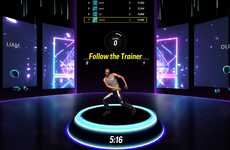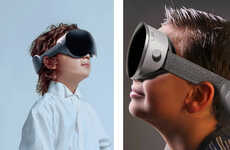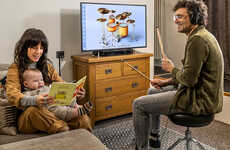
'Teach-U: VR' Makes it Easier to Learn to Play Piano or the Drums
Michael Hemsworth — May 9, 2016 — Tech
Virtual reality is ideal for entertainment, but now 'Teach-U: VR' is here to help make it easier to learn to play piano or drums without having to go to in-person lessons.
Developed by NYU Shanghai students Sean Kelly and Sam Shi, 'Teach-U: VR' teaches young students to play by incorporating the benefits of augmented reality and virtual reality.
If parents want their children to learn to play piano or drums, it usually means long and expensive lessons. However, 'Teach-U: VR' looks to do away with this by allowing kids anywhere in the world to benefit from the technology.
The 'Teach-U: VR' setup utilizes Google Cardboard rather than the Oculus Rift or HTC Vive to help ensure that anyone can gain access to and utilize the technology.
Developed by NYU Shanghai students Sean Kelly and Sam Shi, 'Teach-U: VR' teaches young students to play by incorporating the benefits of augmented reality and virtual reality.
If parents want their children to learn to play piano or drums, it usually means long and expensive lessons. However, 'Teach-U: VR' looks to do away with this by allowing kids anywhere in the world to benefit from the technology.
The 'Teach-U: VR' setup utilizes Google Cardboard rather than the Oculus Rift or HTC Vive to help ensure that anyone can gain access to and utilize the technology.
Trend Themes
1. Virtual Reality Music Education - Virtual reality technology can be used to revolutionize the way music is taught by offering immersive and accessible experiences to students of all ages.
2. Augmented Reality Music Lessons - Incorporating augmented reality into music lessons can provide a more engaging and interactive educational experience for students, leading to better retention and progress.
3. Low-cost VR Technology - Developing virtual reality educational software that is compatible with low-cost VR technology like Google Cardboard can make immersive education accessible to schools, students, and families of all income levels.
Industry Implications
1. Music Education - Traditional music education programs can utilize virtual and augmented reality to improve student engagement, retention, and progress, while also making education more accessible to a wider audience.
2. Virtual Reality Hardware - Developers and manufacturers of virtual reality hardware can expand their market by offering affordable and accessible technology like Google Cardboard to education-focused companies and consumers.
3. Edtech - The intersection of education and technology, or EdTech, can benefit from the development of virtual and augmented reality software and hardware, providing an innovative and immersive option for learning.
4.3
Score
Popularity
Activity
Freshness























